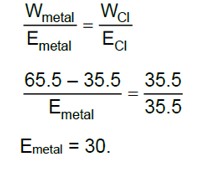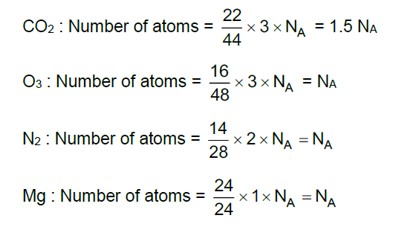Which of the following statements is correct about the reaction given below:
4Fe(s) + 3O2(g) → 2Fe2O3(g)
(i) Total mass of iron and oxygen in reactants = total mass of iron and oxygen in product therefore it follows law of conservation of mass.
(ii) Total mass of reactants = total mass of product; therefore, law of multiple proportions is followed.
(iii) Amount of Fe2O3 can be increased by taking any one of the reactants (iron or oxygen) in excess.
(iv) Amount of Fe2O3 produced will decrease if the amount of any one of the reactants (iron or oxygen) is taken in excess.
Which of the following statements is correct about the reaction given below:
4Fe(s) + 3O2(g) → 2Fe2O3(g)
(i) Total mass of iron and oxygen in reactants = total mass of iron and oxygen in product therefore it follows law of conservation of mass.
(ii) Total mass of reactants = total mass of product; therefore, law of multiple proportions is followed.
(iii) Amount of Fe2O3 can be increased by taking any one of the reactants (iron or oxygen) in excess.
(iv) Amount of Fe2O3 produced will decrease if the amount of any one of the reactants (iron or oxygen) is taken in excess.
This is a Multiple Choice Questions as classified in NCERT Exemplar
Option (A)
According to the law of conservation of mass, matter can neither be created nor be destroyed. In the given reaction,
4Fe + 3O2→ 2Fe2O3
The mass of reactant is equal to the mass of product. Hence, it follows the law of conser
Similar Questions for you
In the medical entrance test NEET, there can be 1 to 3 questions from this chapter. Some year, the Chemistry section of NEET has only one question from this chapter and in some other years, there can be 3 questions.
The following are the key concepts of this chapter: Compound, Elements, Rules, Law of conservation of mass, Addition and Subtraction, Atomic Mass, Law of multiple proportions, and Molecular Mass.
As the name suggests, the first chapter of the NCERT Class 11 Chemistry introduces various basic concepts of chemistry, such as the definition and importance of chemistry, atomic matter and molecular masses, the mole concept, laws of chemical combination, empirical, stoichiometry, and molecular form
Taking an Exam? Selecting a College?
Get authentic answers from experts, students and alumni that you won't find anywhere else.
On Shiksha, get access to
Learn more about...

Chemistry NCERT Exemplar Solutions Class 11th Chapter One 2025
View Exam DetailsMost viewed information
SummaryDidn't find the answer you were looking for?
Search from Shiksha's 1 lakh+ Topics
Ask Current Students, Alumni & our Experts
Have a question related to your career & education?
See what others like you are asking & answering


